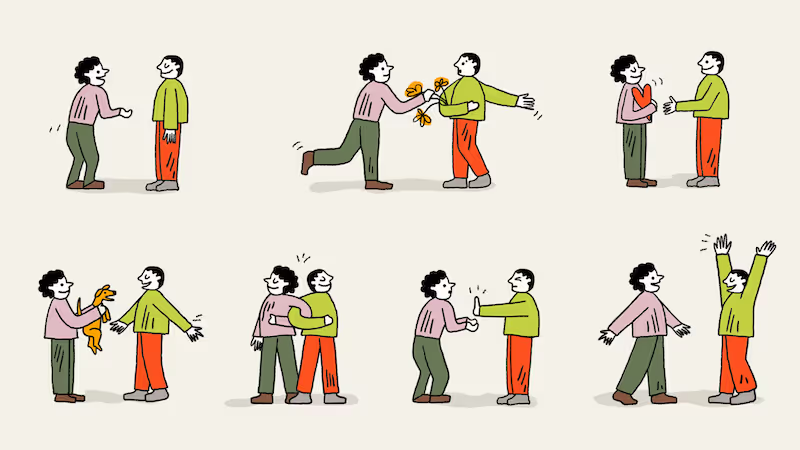At a time in the western world, when we often have premarital sex as a given, contraception in hand, and the permission for sexual connection and pleasure at home, desire seems to be flatlining. We don’t know why it is so difficult to sustain desire, and we want to want.
Many of us, when it comes to sexuality, tend to do what we think we should do rather than what we’d like to be doing (and this is not just a statement about women). We get stuck in ruts and disconnect from our imaginations. We would love to experience new things with our partners but we can be afraid to invite ourselves or them. A minor annoyance or a major impasse can both be catalysts for shutting down sexually. Sometimes we’re “not in the mood;” other times we wonder if we’ve lost what once made us desirable to our partners.
We tend to think of these as sexual issues. Really, it’s an erotic dilemma. Contrary to what we are taught, eroticism isn’t purely sexual; it is sexuality transformed and socialized by the human imagination. The imagination creates the plot. Flirtation, longing, and anticipation all play within our mind’s eye. This is where our erotic faculties live. And eroticism is a time machine. It’s activated by the pains and pleasures of our complicated pasts. It breeds hope and possibilities for the future. It makes us feel utterly present.
Don’t know what I mean? Think about a favorite activity. Let’s say, you love to play soccer, tennis, or ping-pong. Last time, you won your game. Thinking about that win gets you excited about the next time you’ll play. At home, you wash your gear. You text your teammates to schedule practice. You check the weather. There’s a whole ritual that builds anticipation.
So why, when it comes to sex, do people seem to think that just saying “do you want to have sex” after doing the dishes is a sufficient warm up?
Play ball, people! Engaging in eroticism enables us to maintain a sense of aliveness, vibrancy, and vitality. As Octavio Paz has implied, eroticism is the poetry of the body the way that poetry is the eroticism of language. Don’t let a difficult phase be a death sentence for your sex life or your relationship. Together, you can come through it. Consider the following five ways to create meaningful connections with your partner.
Expand your definition of eroticism
The erotic landscape is vastly larger, richer, and more intricate than the physiology of sex, or any repertoire of sexual techniques. It’s worth repeating: the central agent of eroticism is our imaginations. The most overlooked erotic organ is our mind. We can anticipate, dream, and give meaning. If sex is a collection of urges and acts, the erotic is a receptacle for our hopes, fears, expectations, and struggles. It’s about the quality of the experience, not frequency and performance. If you want to feel transported, you have to take risks. I’m not talking about danger; I’m talking about vulnerability of exposure and exploration that heightens trust. Deep eroticism is intimate; deep intimacy is erotic.
Cultivate pleasure for its own sake
Playing it safe gets it done, but if you want a sense of renewal and excitement, step outside of your comfort zone. Creating meaningful connection often requires adjusting the context in which intimacy is taking place. Try to:
- Create the right ambiance. Think again of the soccer game. Nobody expects to play on a littered field. We pay attention to the space, light, and mood. Upkeep of our space ensures we’re ready to play at any time.
- Switch up your routines. No matter how effective our rituals are, if we don’t change it up a bit, they inevitably become boring. Take out separate email addresses just for love notes to each other, take a class, go on walks together at night.
Create meaningful connection through play
Couples who are plagued by sexual boredom would be well to explore the hidden fantasies and desires that turn them on. A great way to do this is to engage in sexual play. Here are some ways to initiate:
- Make lists of sexual turn-ons, such as grooming, good foreplay, emotional sensitivity. Put the list in an envelope, seal it, and put it under the pillow.
- Pick objects that represent experiences when you each felt intense pleasure and excitement. Then pick other ones that represent when you each felt numb, shut down, closed off, and fearful. Let those objects tell your stories. I assure you: you will say and hear things you haven’t before.
- If you had to direct an erotic scene, what would that scene be like? Encourage each other to be detailed. Highly granular. Every detail matters in the realm of pleasure.
Get Away From Performance-Driven Sex
At this moment, getting it done, being efficient, and our obsession with optimatization creates an anti-erotic culture. Sex is not about the orgasm nor does it end with the orgasm. Stop focusing on the physicality of it. Linger. Take your time. Savor. Let things unfold and not be so goal-orientated. And, by the way, foreplay starts at the end of the previous orgasm.
Explore your erotic blueprints
Tell me how you were loved; I will tell you how you make love. The psychology of our desires often lies buried in the details of our childhood and in our relationships with our caregivers. It didn’t start when we found our partners. What gives us intense pleasure sometimes comes from very dimly-lit places inside of ourselves, and from experiences that were actually quite painful. Our imagination compensates for what was missing, and for what may be missing now. Sexual fantasies reveal our deepest emotional needs. Provided you are in a healthy enough relationship to go there, explore the roots of your sexuality with my free Intimacy Inventory. Within it, you’ll find a series of questions and conversation topics that will give you deeper insights into yourself and each other.
Exploring our physical, mental, and emotional depths enables us to deepen our intimacy. Feeling busy, tired, or stressed notwithstanding, it’s this kind of understanding of ourselves and our partners that will help us overcome the obstacles to our desires and bring home the erotic. Have fun.







.svg)





